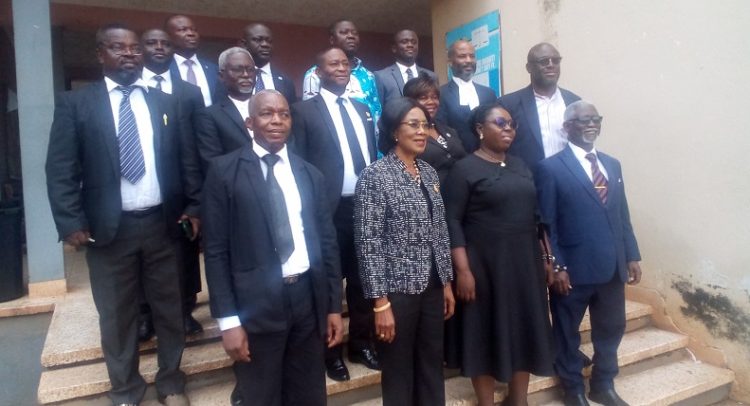Officials in a group picture after 2022 ADR Week
A JUSTICE of the Appeal Court with oversight responsibility for Alternative Dispute Resolution (ADR), Her Ladyship Justice Angelina Mensah-Homiah has warned justices of the connected ADR courts in the country never to recommend cases involving rape and incest for ADR settlement.
She gave the warning yesterday at Sunyani when she launched this year’s Alternative Dispute Resolution Week under the theme, “Improving access to justice in a post-pandemic through the use of ADR.”
Addressing members of the Bar and the Bench including other members of the Judicial Service, Justice Angelina Mensah-Homiah noted that the ADR week is observed every year during the legal week throughout the country as a means of educating the public on the presence of ADR mechanisms in the court’s settlement process or proceeding in the country.
She called on parties in disputes to opt for it for speedy resolution of long-standing cases, saying the ADR makes it easy for access to justice cheaper, easier, expeditious, non-adversarial and faster.
She explained that under the policy directive of the Chief Justice for courts-connected ADR, every legal year is set aside to highlight issues of ADR and educate the public to opt for it for dispute resolution because of its numerous advantages.
“The ADR week affords court users the benefit of using ADR under what is called mass mediation exercise, so we call on members of the Judicial Service and court users to take advantage of the ADR week and use alternative dispute resolution to settle long-standing disputes.
“It helps us to clear backlog of cases that have always bedeviled the courts,” she added.
She also disclosed that there are 132 courts in the country equipped with ADR processes to settle cases, and five mediators assigned to each of these courts.
As part of the efforts, a total of 635 mediators have been trained and assigned to these 132 courts connected to ADR, to improve ADR case management.
“Measures are underway to further expand the court-connected scope to ensure every Ghanaian everywhere access, and more importantly, sustain the desired impact.
“The ultimate goal is to have ADR offices in all courts, particularly the new ones being opened throughout the country,” she emphasised.
According to her, the basic legal mandate for the use of ADR is found in section 72 and 73 of the Court Act of 1993, (Act 459).
All cases except first and second degree felonies (criminal cases) or part of criminal aspects (the not too serious ones sometimes referred to as misdemeanors) are amenable to ADR.
“Criminal cases involving rape and incest are not applicable,” she said.
She, therefore, warned and asked the Bench never to recommend rape, incest and defilement cases for ADR processes. “Don’t ever take issues of rape and incest lightly, and so never go near the girls,” she told the judges.
Present were High Court and Circuit Court judges from across the country, the outgone judge in charge of ADR, Justice Charity Irene Larbi, justices of the Sunyani High Court and the Regional Administrative Officer of the Judicial Service among other court dignitaries.
FROM Daniel Y Dayee, Sunyani


